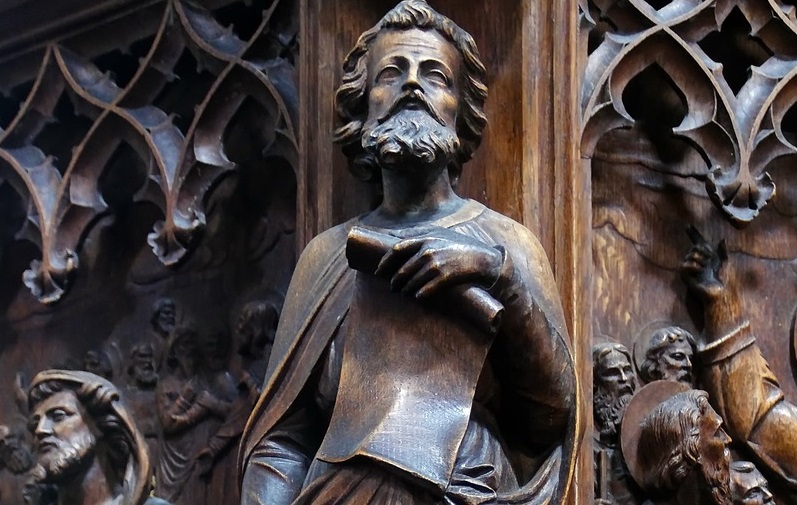It was a strange and gutsy thing to say, dangerous to interpret: what Peter said.
Preaching to those gathered around him (John was there too), he was talking about Jesus, because Jesus was the reason a man had been healed, which had amazed them; that’s why there was a crowd there in the first place.[1] And Peter had simply taken the opportunity, what with the onlookers there, to preach to them, to tell them about Jesus. And he was preaching to his fellow Israelites, presumably many of them natives of Jerusalem. And presumably some of them had heard something about this Jesus before; maybe some of them had heard everything about him already and already thought they knew everything there was to know about this recently deceased radical. But Peter insisted that Jesus was no longer dead, that he had been raised, and that it was in his name that this man had been healed; because Jesus is the Christ, the “Righteous One,” the Messiah, Peter said.[2]
But then he said the strange and gutsy thing: “Now I know, brothers,” he said, “that you acted out of ignorance, just as your leaders did, but God has thus brought to fulfillment what he had announced beforehand through the mouth of all the prophets, that his Messiah would suffer. Repent, therefore, and be converted…”[3] A gutsy thing to say, at the very least, as I said. These are not words many preachers preach on these days, for they are indeed difficult, dangerous to interpret, again as I said.
Nonetheless, it is an inconvenient truth, that ignorance was at work in the in the death of Jesus, the rejection of Jesus. It’s there in the Scripture. Jesus himself said it: “Father, forgive them, they know not what they do.”[4] Stephen said it, preaching just before his own martyrdom; “they did not understand,” he said.[5] Paul, who watched and approved of Stephen’s murder, after his own conversion, said the same: “their leaders failed to recognize him;” had they, “they would not have crucified the Lord of glory,” Paul wrote to the Corinthians.[6] Now these are obviously dangerous texts, because subject to lesser minds, to hateful minds, they can, and have been many times, twisted and misinterpreted by antisemitic hatred—a hatred, like so many of our other hatreds we may have mistakenly thought extinct, but which are not. Such hatreds are still with us, in the Church as well as outside it.
And, of course, I do not here want to discuss the matter of the division of Jew and Christian, synagogue and Church. A homily is not really the place for that. I should simply say—quoting the great theologian, Von Balthasar, that since “God is the author of the problem…to him alone belongs its resolution.”[7] And God will solve it, I believe. Instead, I want to step around the immediate contexts of these words to suggest something perhaps more universal, more ordinary. Still gusty for any preacher to say it because it’s a truth convicting each one of us, a truth we may not care to admit, that we may even refuse to admit.
And that is, ignorance is a thing for which we may, on occasion, need to repent. This is true for each one of us. “I know that you acted out of ignorance. Repent, therefore, and be converted.” This can be said to each one of us, should be said; at some point in our lives this may have been said to us or should have been said; and it may need to be said either to you or to me at some point in the future. “I know that you acted out of ignorance. Repent, therefore, and be converted.” That’s just the truth of the thing; please don’t be offended. In fact, my advice is that you embrace this possibility; for it is, in fact, necessary to human and spiritual maturity. It will even help you get closer to God.
At least that’s what St. Augustine would tell you. Preaching one Christmas, he said, “I am speaking to you as one who was once deceived.” When he was young, he said, he read the Bible but only with the mind to discredit it—in that flippant, sophisticated sort of way, never with “pious reverence.” “I myself,” he said, “was closing the door of my Lord against myself…For I in my pride was daring to seek what only a humble person can find.”[8] This is an experience closer our own: approaching the truth and mystery of God—God’s morality, the Church’s teaching, and so on—with a popular but shallow sophistication, pretending to know better because we don’t really want to know. We just want to get along. Maybe you don’t see yourself here; I see myself. But maybe that’s the measure of the soul this morning: how much we recognize ourselves as ignorant and in need of humility, to repent and be converted.
But that’s the hard thing, isn’t it. This is one of the reasons why our politics is the way it is. Who are the politicians, who are the partisans, willing to admit they were wrong? Which one of them, Christian or otherwise, isn’t a Machiavellian? And this morning, worried about the ignorance and arrogance of nations with their bombs, I think can’t help but think of Dr. King’s preaching: “If I hit you and you hit me and I hit you back and you hit me back…It just never ends. Somewhere somebody must have a little sense.” “[F]orce begets force,” he said; “hate begets hate, toughness begets toughness. And it is all a descending spiral, ultimately ending in destruction for all and everybody.”[9] I pray we can avoid this. St. Bernard of Clairvaux said once, “If ignorance makes beasts of us, arrogance makes us like demons.”[10] That is a universal truth, true for you and me and even for nations. Again, I just pray we can avoid this.
But closer to home, pick your moral conflict: who are the blessed few to wonder whether they might be mistaken, whether they might have gotten carried away by the permissive, marketed hedonisms of the day? And for us parents: it’s hard to admit we may have made mistakes, isn’t it? Because (although it’s clearly nonsense) it might seem we don’t love our children as much as we should if admit mistakes, that we’re not good parents; it might mean we made decisions that hurt them, kind and enlightened though we thought we were at the time. Was he maybe too young for that phone? Was she maybe too young for social media? Maybe our family shouldn’t be doing what those other families are doing. Maybe we were wrong; maybe we need to stop; maybe we need to change. That’s hard stuff to admit, and across the board, we’re not very good at it. And don’t even get me started on clergy! I don’t like it; it’s painful. But, thinking about it, I wonder if that may be why some of us are getting so angry—defensive, certainly, but underneath, I suspect, angrier at ourselves. Because deep down we know.
So how are we to make use of these strange and gutsy words? “I know that you acted out of ignorance. Repent, therefore, and be converted.” What are we to make of that? Well, the first thing to suggest is that to admit one’s ignorance is, in fact, the first step in becoming intelligent. Wendell Berry called it the “first responsibility of intelligence, which is to know when you don’t know or when you’re being unintelligent.”[11] But then we should realize in the same moment that it is God who forgives our ignorance and heals it; that God forgives those who betrayed him, crucified him, sinned against him and his children; that he forgives even politicians and bad parents and parents just doing the best they can; that he even forgives me and even you. If only we can believe that we can always come home to truth, that we can always repent of our ignorance—no matter how ignorant we were. Because the merciful Jesus is truth, and he’s risen from the dead. Amen.
[1] Acts 3:1-11
[2] Acts 3:14
[3] Acts 3:17-19
[4] Luke 23:34
[5] Acts 7:25
[6] Acts 8:1; 13:27; 1 Corinthians 2:8
[7] Hans Urs von Balthasar, Explorations in Theology II:290
[8] Augustine, Sermons for Christmas and Epiphany 1.6
[9] Martin Luther King, Jr., A Knock at Midnight, 57-58
[10] Bernard of Clairvaux, On Loving God II.4
[11] Wendell Berry, The Way of Ignorance, 60
© 2024 Rev. Joshua J. Whitfield










